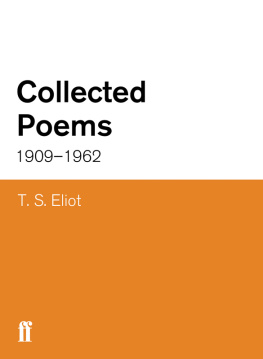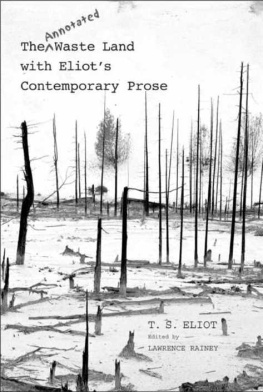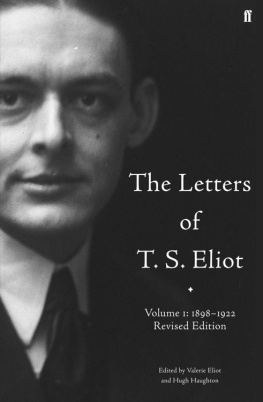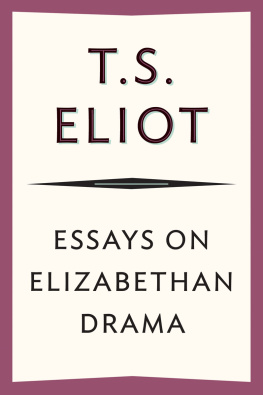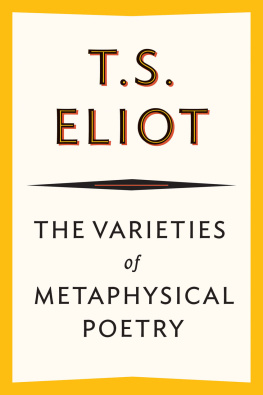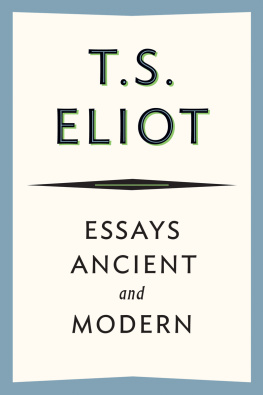T. S. Eliot - The Waste Land and Other Poems (Barnes & Noble Classics Series)
Here you can read online T. S. Eliot - The Waste Land and Other Poems (Barnes & Noble Classics Series) full text of the book (entire story) in english for free. Download pdf and epub, get meaning, cover and reviews about this ebook. publisher: Barnes & Noble, genre: Science. Description of the work, (preface) as well as reviews are available. Best literature library LitArk.com created for fans of good reading and offers a wide selection of genres:
Romance novel
Science fiction
Adventure
Detective
Science
History
Home and family
Prose
Art
Politics
Computer
Non-fiction
Religion
Business
Children
Humor
Choose a favorite category and find really read worthwhile books. Enjoy immersion in the world of imagination, feel the emotions of the characters or learn something new for yourself, make an fascinating discovery.

- Book:The Waste Land and Other Poems (Barnes & Noble Classics Series)
- Author:
- Publisher:Barnes & Noble
- Genre:
- Rating:3 / 5
- Favourites:Add to favourites
- Your mark:
- 60
- 1
- 2
- 3
- 4
- 5
The Waste Land and Other Poems (Barnes & Noble Classics Series) : summary, description and annotation
We offer to read an annotation, description, summary or preface (depends on what the author of the book "The Waste Land and Other Poems (Barnes & Noble Classics Series) " wrote himself). If you haven't found the necessary information about the book — write in the comments, we will try to find it.
The Waste Land and Other Poems (Barnes & Noble Classics Series) — read online for free the complete book (whole text) full work
Below is the text of the book, divided by pages. System saving the place of the last page read, allows you to conveniently read the book "The Waste Land and Other Poems (Barnes & Noble Classics Series) " online for free, without having to search again every time where you left off. Put a bookmark, and you can go to the page where you finished reading at any time.
Font size:
Interval:
Bookmark:
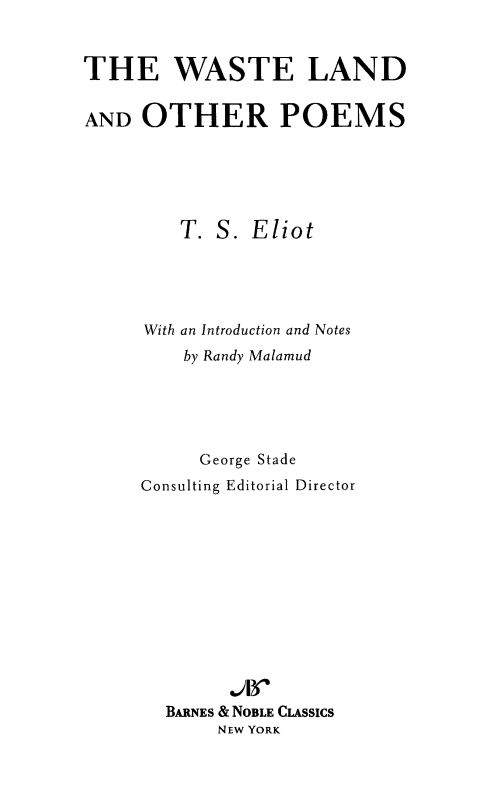
When the evening is spread out against the sky
Like a patient etherised upon a table;
Let us go, through certain half-deserted streets,
The muttering retreats
Of restless nights in one-night cheap hotels
And sawdust restaurants with oyster-shells:
Streets that follow like a tedious argument
Of insidious intent
To lead you to an overwhelming question ...
Oh, do not ask, What is it?
Let us go and make our visit.
To find expression ... dance, dance
Like a dancing bear,
Cry like a parrot, chatter like an ape.
Let us take the air, in a tobacco trance
Sneezes at evening, poking the peevish gutter.
I an old man,
A dull head among windy spaces.
Lilacs out of the dead land, mixing
Memory and desire, stirring
Dull roots with spring rain.
Winter kept us warm, covering
Earth in forgetful snow, feeding
A little life with dried tubers.
Rock and no water and the sandy road
The road winding above among the mountains
Which are mountains of rock without water
If there were water we should stop and drink
Amongst the rock one cannot stop or think
Sweat is dry and feet are in the sand
If there were only water amongst the rock
Dead mountain mouth of carious teeth that cannot spit
Here one can neither stand nor lie nor sit
There is not even silence in the mountains
But dry sterile thunder without rain
There is not even solitude in the mountains
But red sullen faces sneer and snarl
From doors of mudcracked houses.
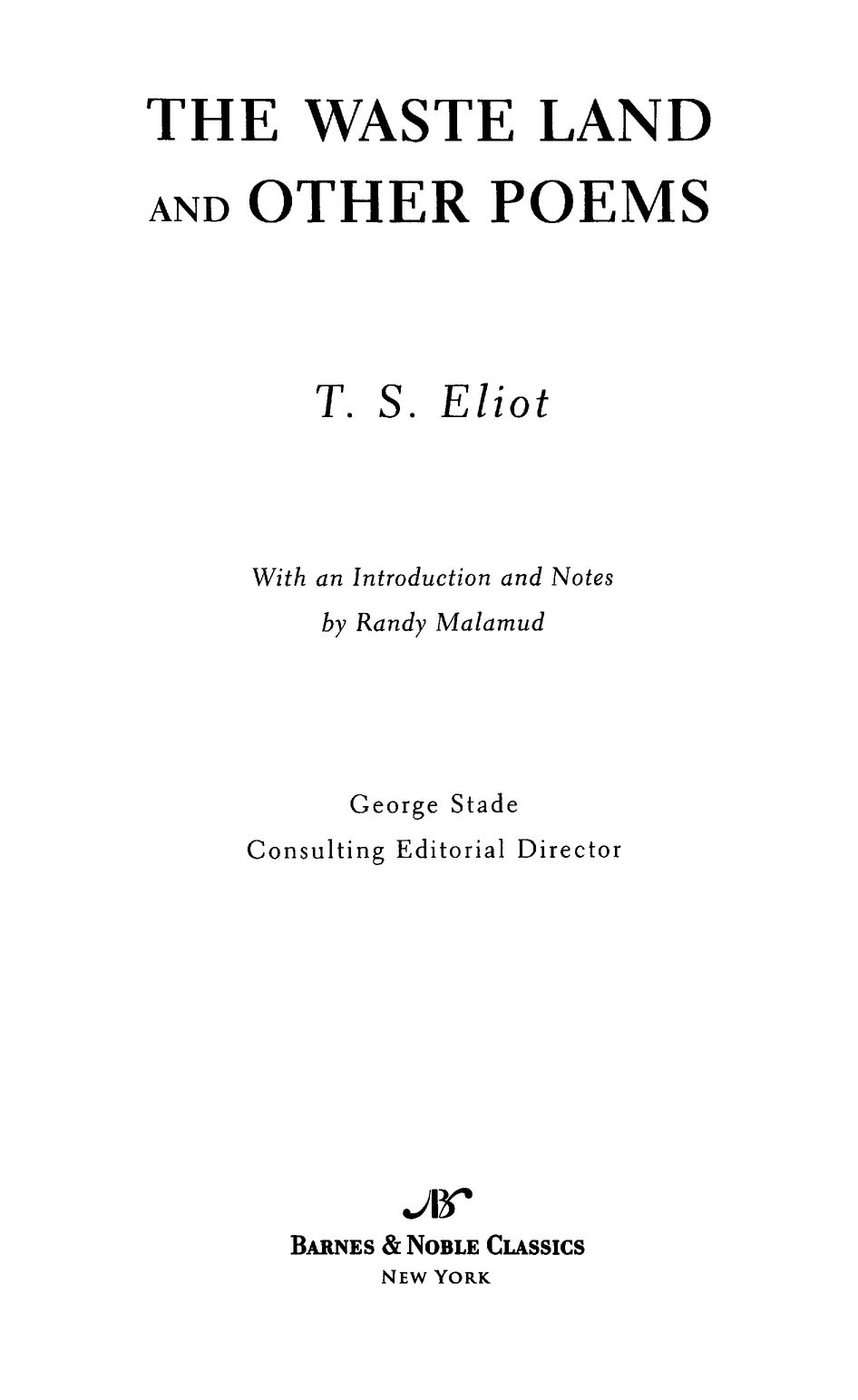
| 1888 | Thomas Stearns Eliot is born on September 26, in St. Louis, Missouri, to Henry Ware and Charlotte Stearns Eliot. The youngest of seven children, Eliot is brought up in a prosperous household. His grandfather, William Greenleaf Eliot, had attended Harvard Divinity School before heading west to found the first Unitarian church in St. Louis. |
| 1889- 1904 | Thomas is educated at Smith Academy in St. Louis. The family spends summers in Gloucester, Massachusetts, where the young boy learns to sail and fish; these summers instill in him a love of the sea and a New England sensibility. William Jamess The Principles of Psychology (1890), Oscar Wildes The Picture of Dorian Gray (1890), Sigmund Freuds The Interpretation of Dreams (1900), and Henry Jamess The Golden Bowl (1904) are published. Queen Victoria dies ( 1901 ). |
| 1905 | Eliot attends Milton Academy near Boston for one year. |
| 1906- 1910 | He joins his older brother, Henry, at Harvard (1906). While an undergraduate, Eliot studies with Irving Babbitt and George Santayana; his academic interests are wide-ranging and diverse. The Symbolist movement deeply influences the young writer. He contributes poems to the Harvard literary magazine, The Advocate, and joins the Signet literary society. While playing the part of Mr. Woodhouse in a production of |
Font size:
Interval:
Bookmark:
Similar books «The Waste Land and Other Poems (Barnes & Noble Classics Series) »
Look at similar books to The Waste Land and Other Poems (Barnes & Noble Classics Series) . We have selected literature similar in name and meaning in the hope of providing readers with more options to find new, interesting, not yet read works.
Discussion, reviews of the book The Waste Land and Other Poems (Barnes & Noble Classics Series) and just readers' own opinions. Leave your comments, write what you think about the work, its meaning or the main characters. Specify what exactly you liked and what you didn't like, and why you think so.

